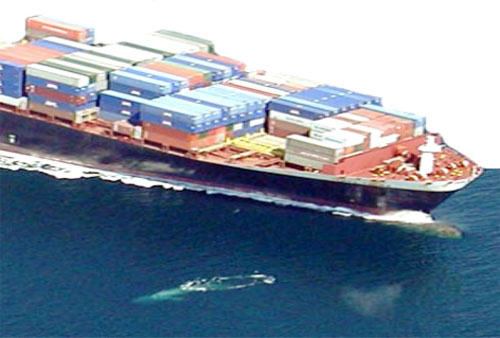The IWC brings ship strikes to the agenda of Whalefest, Brighton.
This month, the International Whaling Commission will be attending the fourth annual Whalefest event to call attention to the increasing number of collisions between whales and vessels. As ocean-going traffic increases, so does the risk of collision between ships and whales, and the IWC is raising awareness and support for a long term research and mitigation programme.
It is clear that the number of ship strikes rose as faster vessels were developed from the 1950s, but building a comprehensive understanding of the problem is not straightforward. Data gathering is very difficult because collisions between larger vessels and whales may go unreported and unnoticed unless the animal is carried into port on the bow of a large ship.
All species of whale and dolphin are affected, but those that swim more slowly, or stay longer at the surface, are most vulnerable. Whilst larger ships pose greater risks to whales, this is an issue for all vessels. Collisions are known to have occurred with freighters, ferries, cruise ships, racing yachts, hydrofoils, military vessels, whalewatch boats, and even kayaks and zodiacs.
In 2009, the IWC established a global database to build an accurate and comprehensive record of ship strikes. Some 1200 incidents have already been registered and each record is verified by scientists who are using the information to develop a better understanding of when, where and why collisions occur.
Long term, the data will help to map incident ‘hot spots,’ enabling scientists, policy makers, industry and other ocean users to work together on targeted, practical mitigation measures to reduce the risk of collision, whilst minimising practical implications for ocean-users. Technological, educational and operational solutions are all currently being explored but for now, the most effective measures are to avoid areas of known concentrations of whales and, where this is not possible, to slow down and keep a sharp look out.
Whalefest has kindly invited one of the IWC’s ship strike data coordinators to raise awareness of the issue amongst all ocean users. In a collaborative presentation with the Germany-based NGO, MEER, Fabian Ritter will be on the Science Stage at 4pm on Saturday 14th March, explaining what we have learnt about ship strikes so far. He will also outline some steps that sailors can take to avoid hitting whales. He will also ask everyone to note the ship strikes database, and use it to report a ship strike if they are unfortunate enough to witness a collision.
To read more about ship strikes please click here.
You can report a ship strike here.

